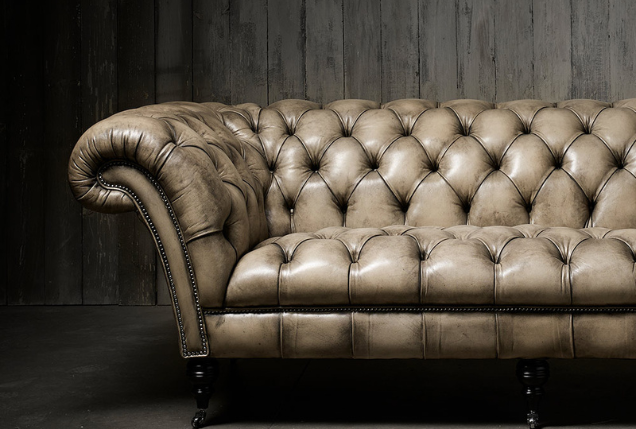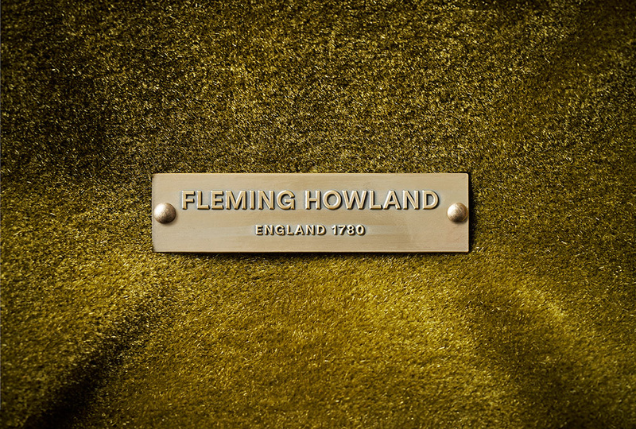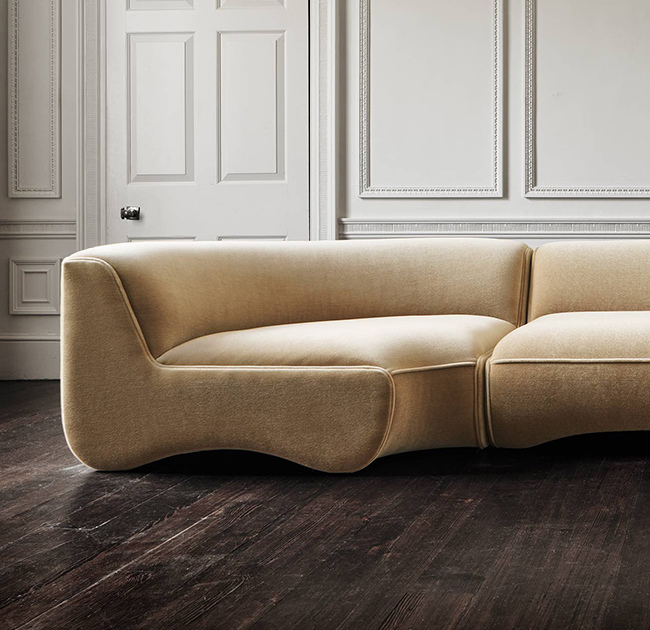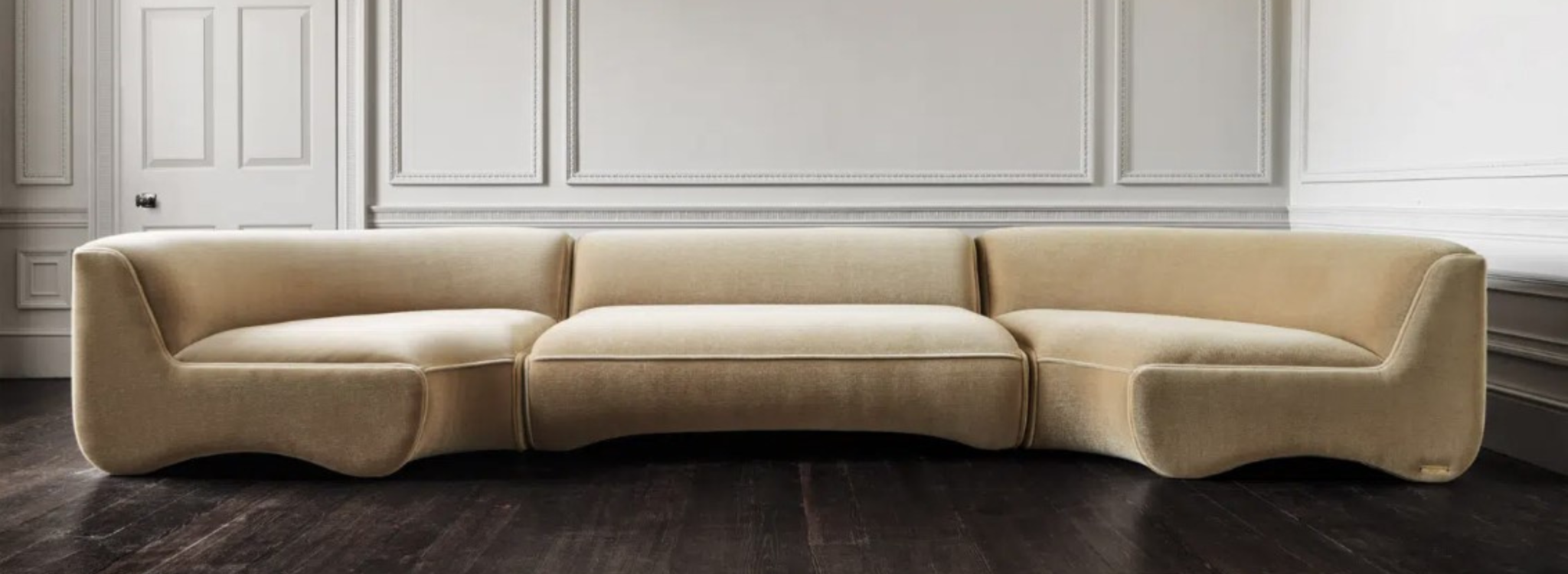LIVING
FLEMING HOWLAND
Heirs to age-old practices, Fleming Howland is a furniture maker from Lancashire, England. With a legacy that is continuously evolving, objects of functional beauty are brought to life. Notions of what it means to be made in England permeates every stitch and fold. At its heart is the meticulous skill of the craftsman and the belief that the legacy will continue to be passed down. This enduring spirit gives a unique perspective to Fleming Howland furniture, imbuing the maker with a much deeper sense of purpose.
SUSTAINABILITY PURPOSE
Surrounded by the mills, lakes and valleys of Lancashire, Fleming Howland are constantly reminded of how much they owe to nature, and of their place in the industrial history of the nation. Their work offers a tangible connection to the past, living proof of the quality and craftsmanship that once made British manufacturing the envy of the world. They are also aware of their role as a responsible, sustainable business. Their age gives them a broader perspective. They have seen the world transform time and time again, but those changes only have made them more certain of their beliefs.

Established
2007
Headquarters
Lancashire, UK
Employees
24
Categories
Luxury interiors
Website
Distribution
Worldwide
SUSTAINABILITY REPORT CARD
Positive Luxury powers the Butterfly Mark, the only assessment and certification designed to shape a sustainable future for the luxury industry and luxury consumers
REAL CHANGE IN ACTION

Sustainable Sourcing

During their certification process, Fleming Howland initiated active engagement with key suppliers to comprehend their energy management, waste and water practices. The brand employed an ESG checklist, a strategic tool set to evaluate environmental, social, and governance factors, ensuring an understanding of their key suppliers’ sustainability efforts. Additionally, Fleming Howland developed a robust Supplier Code of Conduct, outlining environmental requirements. This code mandates suppliers to adhere to specific standards, fostering a collaborative approach to sustainability. Through these measures, the company not only ensures compliance but also promotes a culture of environmental responsibility across its supply chain, aligning its operations with broader sustainability goals.

Circular Economy

Each Fleming Howland piece is handmade, and the business is taking steps to incorporate circular economy practices into its operations. With 90% of raw materials being locally sourced, emissions from transportation are minimised. Unlike industrial tanneries that use chemical dyes, Fleming & Howland employ traditional techniques using natural vegetable-based dyes. This not only produces supple leather with a warm, natural fragrance but also reduces energy consumption and waste. The natural dyes allow the leather to age gracefully, enhancing its appearance over time. Furthermore, the Circular Outlet by Fleming Howland offers ex-display and reconditioned items, extending the life of their handmade furniture and supporting a circular economy.

People Management / Ethics

Fleming Howland has implemented and regularly updates an employee handbook that underscores their commitment to fostering a supportive and inclusive workplace. The handbook covers key areas such as learning and development, skills enhancement, health and wellbeing, reward and retention strategies, and diversity, equity, and inclusion (DE&I). Recognising the importance of professional growth, the company has established a formal policy outlining clear objectives for internships and offers structured performance reviews to provide constructive feedback. Additionally, employees have access to ongoing training programs designed to support their professional development, ensuring they have the tools and opportunities needed to thrive in their careers. Through these initiatives, the brand not only prioritises employee satisfaction and growth but also cultivates a culture of continuous improvement and inclusivity.

Sustainability Purpose/SDGs

During the certification process, Fleming Howland enhanced and defined their sustainability purpose as a brand. Their purpose statement highlights how the brand focuses on attracting customers who share their values rather than pursuing the highest number of buyers. A core value for Fleming & Howland is to encourage people to buy fewer but more enduring and cherished objects. With the average sofa lasting just six years, it's clear that many are either poorly made or discarded prematurely. In contrast, Fleming & Howland are dedicated to crafting furniture that exceeds typical lifespan expectations. This commitment is kept through the careful selection of high-quality materials and an artisanry standard designed to be appreciated and maintained for generations. The brand’s sustainability purpose is further supported by its alignment and analysis of several Sustainable Development Goals.
During their certification process, Fleming Howland initiated active engagement with key suppliers to comprehend their energy management, waste and water practices. The brand employed an ESG checklist, a strategic tool set to evaluate environmental, social, and governance factors, ensuring an understanding of their key suppliers’ sustainability efforts. Additionally, Fleming Howland developed a robust Supplier Code of Conduct, outlining environmental requirements. This code mandates suppliers to adhere to specific standards, fostering a collaborative approach to sustainability. Through these measures, the company not only ensures compliance but also promotes a culture of environmental responsibility across its supply chain, aligning its operations with broader sustainability goals.
Each Fleming Howland piece is handmade, and the business is taking steps to incorporate circular economy practices into its operations. With 90% of raw materials being locally sourced, emissions from transportation are minimised. Unlike industrial tanneries that use chemical dyes, Fleming & Howland employ traditional techniques using natural vegetable-based dyes. This not only produces supple leather with a warm, natural fragrance but also reduces energy consumption and waste. The natural dyes allow the leather to age gracefully, enhancing its appearance over time. Furthermore, the Circular Outlet by Fleming Howland offers ex-display and reconditioned items, extending the life of their handmade furniture and supporting a circular economy.
Fleming Howland has implemented and regularly updates an employee handbook that underscores their commitment to fostering a supportive and inclusive workplace. The handbook covers key areas such as learning and development, skills enhancement, health and wellbeing, reward and retention strategies, and diversity, equity, and inclusion (DE&I). Recognising the importance of professional growth, the company has established a formal policy outlining clear objectives for internships and offers structured performance reviews to provide constructive feedback. Additionally, employees have access to ongoing training programs designed to support their professional development, ensuring they have the tools and opportunities needed to thrive in their careers. Through these initiatives, the brand not only prioritises employee satisfaction and growth but also cultivates a culture of continuous improvement and inclusivity.
During the certification process, Fleming Howland enhanced and defined their sustainability purpose as a brand. Their purpose statement highlights how the brand focuses on attracting customers who share their values rather than pursuing the highest number of buyers. A core value for Fleming & Howland is to encourage people to buy fewer but more enduring and cherished objects. With the average sofa lasting just six years, it's clear that many are either poorly made or discarded prematurely. In contrast, Fleming & Howland are dedicated to crafting furniture that exceeds typical lifespan expectations. This commitment is kept through the careful selection of high-quality materials and an artisanry standard designed to be appreciated and maintained for generations. The brand’s sustainability purpose is further supported by its alignment and analysis of several Sustainable Development Goals.
Standards & Accreditations
To provide evidence of sustainability performance across luxury companies' full value chain, 180+ memberships, accreditations and specialist certifications are taken into account during assessment

FSC Certified

PEFC Certified

The Responsible Wool Standard
 mono.webp)
Responsible Down Standard (RDS)
JOURNEY SO FAR
08/2024
CERTIFICATION
08/2024
FINAL SUBMISSION
03/2023
RISK MAPPING
01/2023
BASELINE SUBMISSION
10/2022
BEGAN ASSESSMENT
WHY POSITIVE LUXURY
We care about the impact humans cause on the planet by retail consumption. As a result, we want to minimise this effect where possible. We want to do more than increase the lifespan of our furniture and ensure that every aspect of the business is conducted in the most ethical of ways.
PAUL FLEMING
CEO & FOUNDER


